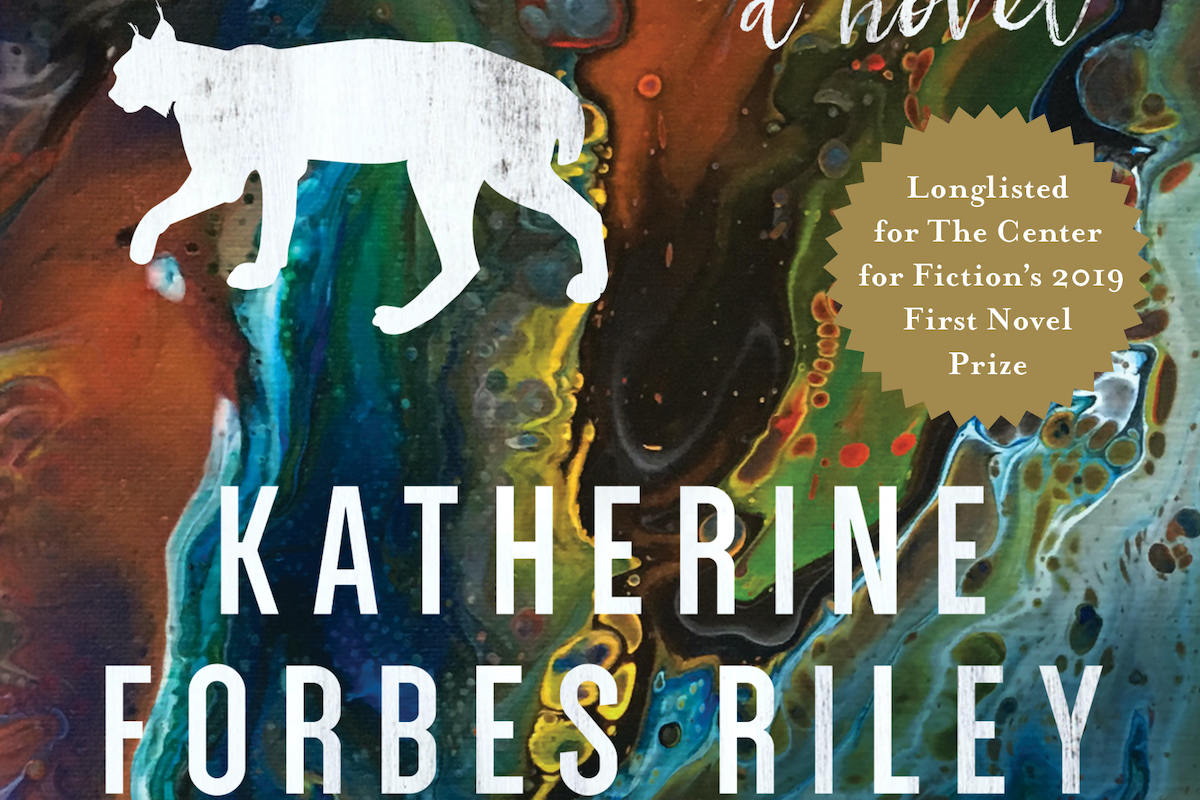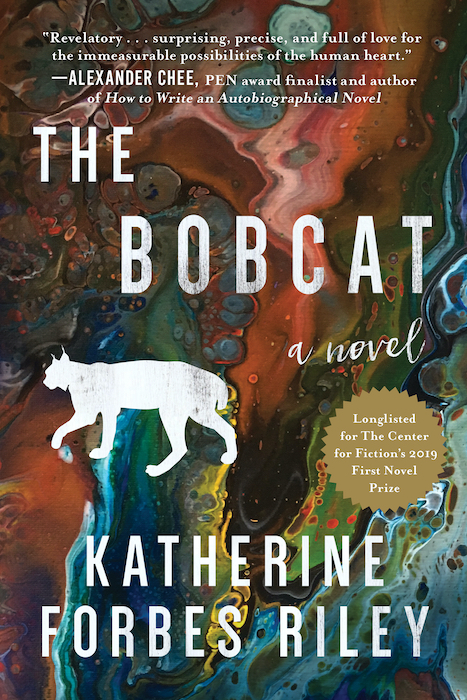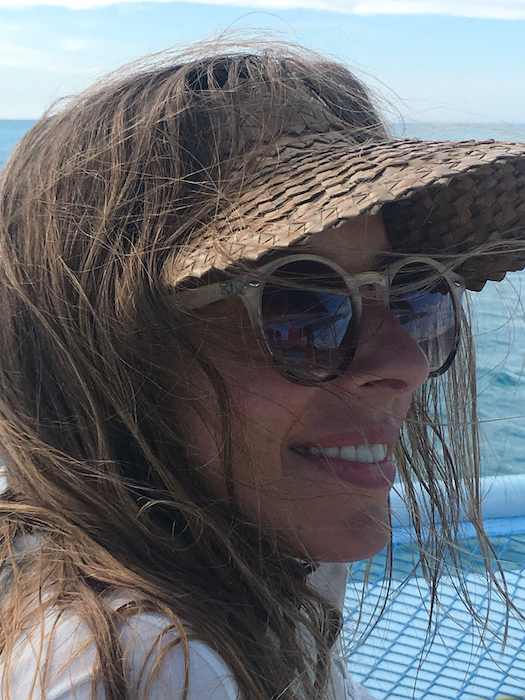
The Bobcat by Katherine Forbes Riley
It was a pleasure to chat with Katherine Forbes Riley about her debut novel, The Bobcat.
About the book: With the hypnotic intensity of Emily Fridlund’s The History of Wolves comes a mesmerizing love story in lush, gorgeous prose that examines art, science, nature, and the magic of human chemistry. Laurelie is an art student who has retreated deep into her imagination in the aftermath of a sexual assault. One day in the woods, she and the child she babysits encounter an injured pregnant bobcat and the reclusive hiker who has been following it for hundreds of miles. Together in the wilderness, they construct their own kind of separate peace. Then the child goes missing, forcing them all apart, and each must find a way to reenter the world alone.
You can read an excerpt HERE.

1. How we heal from trauma is a major theme in THE BOBCAT. How did you approach incorporating nature, science, and magic into writing about trauma?
They followed very naturally, actually. To me, Laurelie is a badass. She’s extremely strong mentally. I mean, she’s drugged and raped at a fraternity party and can’t remember enough details in the morning to prove it. That’s enough to make a young woman crazy already, and then beyond that, she doesn’t have any good friends to talk to about it at home or college, nor does she have a good relationship with her mother. So she’s really alone. And yet she doesn’t fall apart. She doesn’t seek institutional help either, which could have been a good idea for some women. Instead, what she does is retreat deeply into her mind, which is a place where nothing is real, where everything is a little unreal and so also a little magical.
She moves off campus and finds two half-dead kittens in a junkie park, and by then, she has become rather cat-like herself, prowling the city streets instead of going to classes. But the kittens awaken in her an instinct to protect them, and to do that, she must do more than primitively survive. So she gets the rest of her college tuition back and transfers her little clan to another college, somewhere as different as she can find: as north as she has been south and as rural as she has been urban. And there they live in a little cottage in the woods all by themselves, and she babysits the landlord’s kid to pay for it, taking him into the woods with her all the time.
She’s not normal anymore, but she’s still strong, still functioning. She’s so strong mentally she could have retreated completely into her mind. But the interesting thing about trauma is that it’s such a shock to the system; it destroys all the established mental structures so that the input coming in must be processed at its most honest level, even just that fundamental current of being alive. And from deep in her mind she’s feeling it like magic, the little nips and growls of her cats and the sunshine and river and trees, and the young boy with her is feeling it too, he’s magnifying it and so does the art she’s making, which is her mind’s way of trying to process the raw input, to cycle it through. And so in this demolished state, unusual inputs like the hiker and the bobcat that she would normally have found too strange and avoided now not only prevent her mind from completely shutting its doors, but in fact as she steeps in them, cause those doors to open wider, wanting more. In the end, they’re wider than ever, and she’s pushing out stronger than she ever could have before the trauma occurred.
I think it’s pretty amazing how we can come back stronger after trauma. The four main characters in The Bobcat all do this in different ways, not just Laurelie but also the hiker and the boy and the bobcat too. I find it interesting that some readers loved the ending, but at least a few said they wished the magical air had remained. While I respect the latter point of view, the hiker didn’t want to have just been some magical figment. He wanted to be real, a real-life superhero, a badass too. And that’s where the science came in, where the magic was grounded in external reality. The magic current of life is real, but at the same time, science provides another perception of the same phenomena. I don’t think they’re mutually exclusive.
2. Which character do you relate to the most?
In spirit, Laurelie is much the young woman I was in college. I am not her anymore, which is why I was able to distance myself from her and imbue her with pieces that are both more and other than me. But I can still remember being her, and so I drew on those memories a lot while writing her. It was kind of an exorcism, cathartic to get her out of me and leave her in a good, positive place with someone as great as the hiker.
But Laurelie and the hiker both contain pieces of me. They also both contain pieces of my husband. I literally cut us both up and refashioned our pieces into these two characters, adding other aspects, of course, that neither of us contains since The Bobcat is fiction. I can remember being like, Oooh, I can take that from me and give it to the hiker! Or, I can take that from my husband and give it to me! And how wrong for a moment it felt each time as if I had some loyalty to adhere to, and then the epiphany that followed of, No, I don’t have to be loyal to anyone or anything! I can mine aspects of all the people around me! I’m writing a second novel now, and this is still very much an epiphany for me; I still have this really rigid feeling when I write fiction that I have to be truthful when I don’t. I’m not sure if this will ever come naturally to me.
3. I am always interested in how novels are conceived. Tell me a little bit about why you wanted to tell this story. Did it start with a character or a place or event?
It is said that one’s first novel is often the most autobiographical, and that makes sense to me. I was learning to write a novel as I wrote The Bobcat and made a conscious practical choice to mine my personal experience, my own low-hanging fruit, because I’ve always kept a journal and so personal writing has always come most easily to me. But the idea this time was to write a novel, not a memoir, and so I wasn’t trying to recreate reality in any way. I revere art almost like people do religion. I think it is a very wonderful, powerful thing to create. In The Bobcat, I was trying to create a love story because my own life’s love story has been so impactful to me. I am certain that meeting and staying with my husband was the best thing I ever did, that it probably saved my life.
At first, I tried only to write a simple Harlequin-style romance. I thought it would be easiest since the narrative arc is so fixed (e.g., Girl Meets Boy, Girl Loses Boy, Does Girl Get Boy Back?). But I soon learned that writing a novel involves much, much more than a basic backbone, that even keeping track of that backbone while immersed in the flesh requires much slippery sleight of hand. I wrote and rewrote The Bobcat many times over six years, and both the content and the characters’ relationships changed a lot as I went. Still, every time I went back, I found the paragraphs that remained had a lyricism that came from realism, came from some unexpected sensory details that resulted from my actually having experienced what I’d written there, albeit in some other form or place. So that became my final goal for the whole body of The Bobcat, to imbue every scene with what I’ve experienced in some other form or place, while still putting it all together into my characters’ own unique love story.
4. What’s the best writing advice you’ve received? What’s the worst?
The best and only for me: "Ever tried. Ever failed. No matter. Try again. Fail again. Fail better" (from Samuel Beckett's 1983 story "Worstward Ho").
The worst: I’ve heard quite a few at this point, and here are two:
1) “Only the Big 5 are worthy publishers.” They are insanely powerful, it’s true, but it’s not like their beliefs about what is “good” produce statistically significant scientific results. They’re just tastemakers with a huge publicity arm gleefully forcing their favored picks down our throats. Their editors are the gatekeepers to all the world for our work, but they certainly aren’t oracles. Most of the Big 5 novels don’t earn out, and most of their authors aren’t picked for the big publicity push anyway.
2) “Hire an external publicist.” Only the expensive ones with strong publicity connections are going to impact fame or fortune significantly. A lot of authors still think it’s worth trying even knowing this, and I did too, but I didn’t have a good experience.
5. What are you reading?
Right now, I’m deeply immersed in Middlemarch, by George Eliot. It’s a long novel at 736 pages, and so it requires a commitment. I read it many years ago and had considered it one of the best novels I’d ever read way back then, but opinions can swing wildly with life experience, and so I’ve wanted to reread it. I’m still impressed, blown away, in fact. I can’t wait to get back to it each night. It is 150 years old, and yet that woman’s insights into the human psyche are as astute and relevant as ever.
I also find it fascinating that she wrote as a man. That she looked a stereotype in the eye and said, “fuck that,” and then proceeded to write a 736-page novel exposing it as a total fallacy. Middlemarch is so sarcastic! She’s exposing herself and all of us with unflinching honesty and silently laughing about it. For example, how true and cutting and laughable is this excerpt below, and almost every line is just like it:
“and in relation to his authorship, he leant on her young trust and veneration, he liked to draw forth her fresh interest in listening, as a means of encouragement to himself: in talking to her he presented all his performance and intention with the reflected confidence of the pedagogue and rid himself for the time of that chilling ideal audience which crowded his laborious uncreative hours with the vaporous pressure of Tartarean shades.”
— Middlemarch (Evergreens) by George Eliot

Katherine Forbes Riley is a writer and computational linguist. She received her BA from Dartmouth College and her doctorate from the University of Pennsylvania. She has been co-PI on multiple NSF grants, and her award-winning research appears in scientific journals such as Speech Communication and Computer Speech and Language. Her creative writing appears in Wigleaf’s top 50 list and DecomP, among other venues, and received the Buffalo Almanack Inkslinger’s Award for Creative Excellence. The Bobcat, her first novel, was long-listed for The Center for Fiction’s First Novel Prize. She lives in Vermont with her husband and two children. You can find her at www.katherineforbesriley.com.







